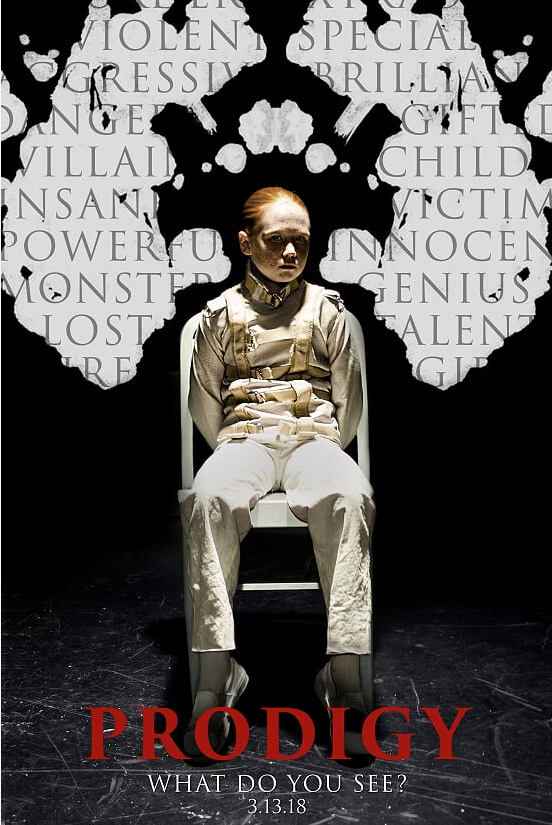
Last month, director Alex Haughey contacted me via Twitter and offered to let me look at his and Brian Vidal’s indie film PRODIGY, a sci-fi thriller about a psychologist called in to evaluate a dangerous 9-year-old girl. After a bit of banter, Alex was kind enough to provide me with a screener.
Done impressively well on a shoestring budget, PRODIGY combines Hannibal Lecter with Will Hunting; a therapist working to reach a child with a seeming emotional detachment from her own humanity. It’s not the kind of film that leaves you with nightmares… but it is the kind of film to make you consider the human side of monsters, or perhaps to consider the humanity of others before you judge them to be monsters.
I got back in contact with Alex Haughey after viewing the film and asked him for an interview, and instead of a simple interview, I was graciously allowed to speak with himself, Director of Photography and Executive Producer Hisonni Johnson, Cinematographer Genaro Marzan, and the two leads, Richard Neil (NOTHING LIKE THE SUN) and Savannah Liles. There are some things about PRODIGY I really don’t want to spoil, but in talking about the film, the spoilers will come up—so, reader beware.
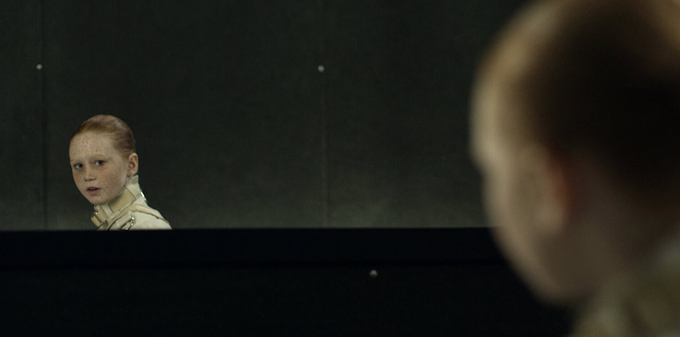
PRODIGY is one of those films where the influences are very clear but so chimeric and interesting that it can still be enjoyed as its own thing. You will undoubtedly pick up on THE SILENCE OF THE LAMBS in the mask/cart images or the adversarial nature of the main characters, and perhaps THE SIXTH SENSE, in the tangle between an adult doctor and a child patient. Or perhaps THE BAD SEED or VILLAGE OF THE DAMNED, in dealing with an extraordinary child who must be contained.
When I asked about the films that influenced PRODIGY, I mentioned that I had a few guesses as to his influences and that I think PRODIGY actually improves on some of them in the way that Fonda redeems Ellie. Alex gamely asked me, “Well, wait, tell me what YOU think…?” I mentioned THE SIXTH SENSE, for this feeling of a child and an adult working together on an issue of mental health, and the most obvious influence, THE SILENCE OF THE LAMBS. Alex agreed with these, but also went on to name a few more that hadn’t occurred to me yet: FIRESTARTER, for the sense of adults trying to harness the lethal powers of a child, and TWELVE ANGRY MEN, where a lone standout in a room full of jurors must champion the accused and press his peers into a deeper examination of the evidence. Given the Psychologist’s name (Fonda, duh, McFly), this should have been a very obvious connection.
But there are many other influences that shaped PRODIGY. One of the strongest was GOOD WILL HUNTING, in having a doctor contend with a patient who is adversarial and wants to shake him loose, but ultimately needs to be saved, and how that doctor approaches the problem with his particular toolkit and his instincts to guide him. Haughey and Vidal blended all of these inspirations into a really beautiful story of trying to overcome a savant’s disconnection from her own humanity before it’s too late for her.
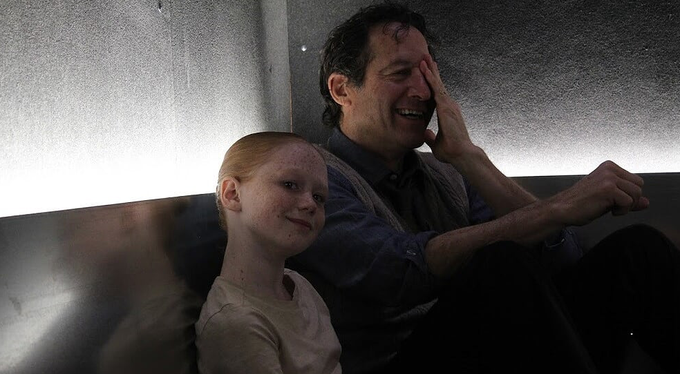
PRODIGY opens with a series of home movies, depicting the families of two very different daughters, leading up to drastic changes in both families’ lives. We then meet the father in one of these families, Psychologist Dr. Jimmy Fonda (Neil), when an old college friend of his, Agent Olivia Price (Jolene Anderson), collects him to meet his latest consultation/evaluation: Eleanor (Liles), a 9-year-old girl, whom has been placed in the kind of military-grade lock-up that is reserved for serial killers (or perhaps velociraptors).
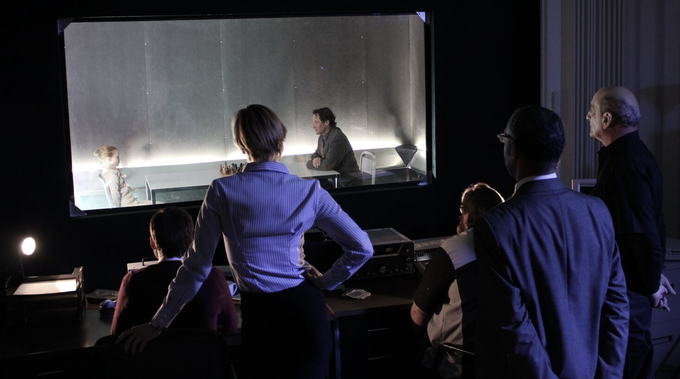
Before Dr. Fonda can meet and evaluate Ellie, he must first be introduced to her ‘handlers’. After a clipped read-through of prisoner security protocols by Colonel Birch (Emilio Palame) – who happens to sport a nasty shiner — Fonda meets the rest of the team: Dr. Keaton (David Linski), the self-involved staff psychiatrist; Ryan McKrosky (Aral Gribble), the dude-bro technician charged with maintaining the punishment system that is keeping Ellie under control, barely; and finally, the cagey Dr. Werner (Harvey Q. Johnson), the facility’s resident biochemistry expert and a guarded, measured, and objective commentator — an inscrutable man of science, objective and with uncertain priorities.
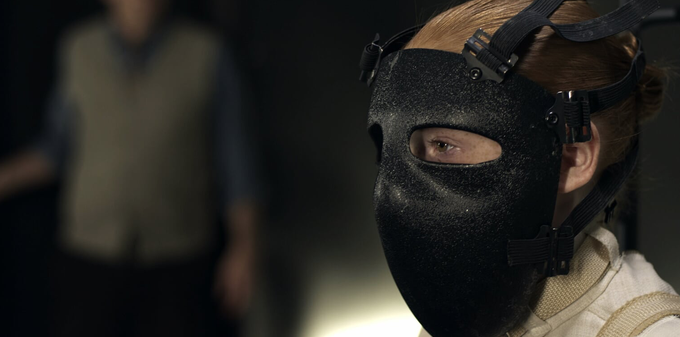
On his way into the interview room where Ellie waits, we note Dr. Fonda’s growing concern as he passes by the cart and mask that are used to restrain Ellie for transport. Before he enters, Olivia takes a moment to remind him to keep an open mind about what he’s about to see. A bemused Fonda smiles and goes about his business.
In the first few minutes of meeting Ellie (who is restrained to a chair), Dr. Fonda discovers her to be highly observant and intelligent, but also remarkably unkind to him, judgmental, and even adversarial. As Ellie takes apart his life in the casual clues he gives off with the disdain of a bug she is vivisecting, Dr. Fonda begins the work of unraveling Ellie’s crisis, trying to understand why this child is in restraints. She begins to drop hints, part shedding the protections she has, partly building new ones. She lets him know that she’s responsible for the black eye Colonel Birch is sporting, and that she’s taken a life. And it’s here where Dr. Fonda quickly realizes that he may be in way over his head, as he discovers that Ellie has very little time left; he is a last-chance attempt to reach Ellie before she is dissected and autopsied for a research study. As he returns to the control room, he is astounded to discover that, outside of Olivia, not one of her handlers argues that she should live.
I don’t want to spoil what follows because I believe in it and I hope you’ll see it without getting the plot twist spoiled. Stop right here and see it, if you find the trailer and my description intriguing. SPOILERS FOLLOW.
PRODIGY takes a normal, moral character (Neil’s Fonda), and puts him in an extreme situation, one where his character is an important as his skill set. He works through the worst event of his own life in trying to uncover the secrets inside Ellie’s extraordinary head, as she works around him with a cagey intellect, or threatens to tear him apart with burgeoning telekinetic abilities. The cast agreed with FIRESTARTER as an influence, but Ellie is no Charlie McGee; she is closer to The Leader, from the Hulk.
Dr. Fonda succeeds in saving Ellie, of course, but he does it not with insider information given in Riddler-like clues, as Clarice Starling had, or a tape recorder that picks up ghosts talking, as Dr. Malcolm Crowe did… he resolves these issues by being good at his job, by knowing how kids work and how they break down, and not seeing a monster in a cage, but a living, breathing kid, in need of his support and trust—the way Sean does in GOOD WILL HUNTING. That’s my biggest love for this film; they managed to resolve the central conflict of the film all believably without putting people into happy-ever-after boxes.
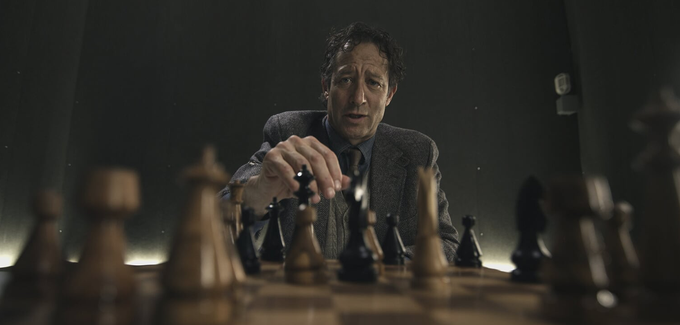
Fonda probes Ellie in a cat-and-mouse conversation between two supremely confident people. She’s essentially a bully, who can either crush you intellectually or by bringing the roof down on top of you telekinetically. Fonda’s a chess player—literally and figuratively—and it shows in his patience and what he holds back as she works him from her superior intelligence. He stands up to Ellie by carefully asserting who he is, in a transparent, easy manner.
She pushes back by demanding lunch in a condescending, ugly matter, or lashing out. She’s clever and hyper-intelligent, but she lacks his wisdom and grace. She is toying with him, and although he’s also a bit worried by her, he’s also encouraged; Ellie’s little episodes of unpleasantness also reveal clues about who she really is and what she’s really doing in a cage. Fonda outwits her, not by trying to outwit her, but by letting her outwit herself.
PRODIGY grew out of Alex and Brian bouncing ideas off of each other for what they could do with the materials they had on hand—sets, locations, cameras, and so on.
“Brian, who’s not here — he’s too busy for us now — he and I knew each other for over 10 years. We met at (film) school, at USC, and we started working on projects there, and even after graduation, continued working on shorts and scripts with each other… until we finally decided that we got good enough at making something out of nothing, and though that we could apply that to the feature world. Give ourselves a set of limitations and try to work with those… and PRODIGY is what came out of that.”
“And how did Hisonni Johnson and Genaro Marzan come aboard?”
“Well, I knew Hisonni from a long time ago on a project we’d worked on together. He came on and helped us really early on, ’cause we filmed in Riverside (California, about 16 miles east of Los Angeles) which is kind of his domain… he basically owns the county of Riverside, as far as filming in that area goes…” As Alex talked, Hisonni grinned and nodded. “…and he and Genaro were a package deal… they have a team that does all kinds of awesome stuff… and then, Savannah and Richard were the first pieces to come on board at that point. The outline came together quickly and the first draft… and we refined, and refined, and refined, and we worked on it for a year until we were ready to turn it over—"
“Woah, woah, woah!” Hisonni cut in. “I thought this was a documentary, dude!”
Richard, Savannah, Alex and I fell into laughter.
Genaro offered, “See, our movie magic is so good, we fooled even you, Hisonni… which I’m sure Richard and Savannah know from their personal experiences as being these people…”
“Oh, yeah… Richard is a psychologist in his spare time,” Alex agreed, “and Savannah is actually a psychopath…”
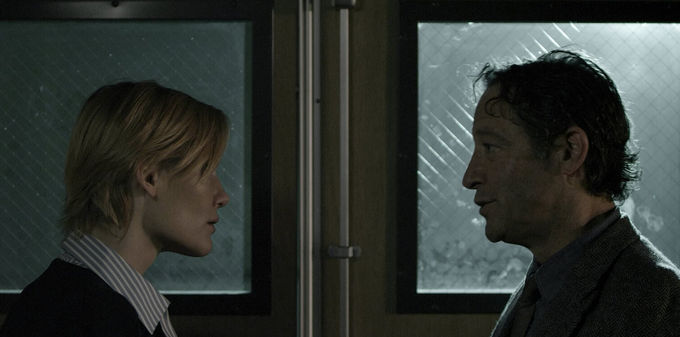
When I asked him what the impetus for PRODIGY was, Alex related that it originates in a logline contest that Brian Vidal had won with the following blurb: ‘a psychiatrist is hired to help a young boy learn to control his superhuman abilities after a tragic accident’. So, the focus of the film, Ellie, actually began life as a boy. Alex described the casting process as grueling. “We just weren’t getting what we wanted with the young male actors we auditioned, so we decided to open it up to young female actors, and that’s when we lucked into Savannah. As you can see, (the logline) isn't exactly the way movie turned out, but provided us a great jumping off point for our outline process.”
Liles is a remarkable find. Savannah Liles is a natural, and nothing like Ellie. She described a very happy set, one where her director, Alex “spun me around by my legs between takes.” My dad did this to me as a kid, and I can attest to the trust, fear, and adrenaline it produces. It’s easy to forget sometimes that this is child acting, and not an adult; Alex and Brian did a brilliant job of getting her to perform. Savannah confessed that her biggest issue was the adult dialogue, which was written for a character with a mental age of about 24 and not a child of 9. I cannot imagine the kind of burden it is to go from doing two or three pages of kid dialogue for a walk-on appearance on a television show, to having to remember 60+ pages of adult dialogue, the majority of it done as three two-hand scenes with a bunch of expectant adults watching you and yelling CUT when you flub a line.
The performances, and the chemistry between Fonda and Ellie, work well in both the moments they agree and the ones where they are dancing around each other. Richard Neil demurred when asked about his preparations for the role and seemed to circle back to the film’s big influences… specifically, 12 ANGRY MEN. The psychologist he plays is a note-perfect blend of intrepid explorer and quiet tactician, and I am in awe of the performance he gave. Neil had arguably the hardest job of the actors on the set, in that he was initially alone the first week, performing his lines with the script supervisor (Colleen Dallons, also the Assistant Director, who read in place of Savannah before she came on set). “It was a relief when the rest of the cast joined in week two, not to be alone anymore!”
The one character in PRODIGY I hated (initially) was Ryan (Gribble). He was putting out a lot of Dennis Nedry vibes and cues that just made me groan; in his first few moments, you almost expect him to say, “Don’t get cheap on me, Dodgson.” Ryan’s a toxic, unprofessional presence, and his team members share looks to tell you that they agree that he is. But Ryan makes a heroic heel turn that is profound and earned, engaging in a believable level of heroism at an appropriate moment, and retreats back into self-interest in exactly the same way, that gives me a sense of affection for him — I really warmed to him, despite never wanting to have to rely on the character to prevent Ellie from escaping.
Some of the characters, like Dr. Keaton, you may have trouble remembering after viewing, despite a solid performance from Linski—the character melts into the background, as Keaton does little to dominate the conversation, which in fairness to Linski, is exactly how a psychiatrist would play the situation. The three supporting characters that fascinate me the most are the Colonel (played gruffly and humorlessly by Palame), Olivia (who has a back story and an after-story with Fonda that I really want to see more of), and Dr. Werner, who is helpful at times, but difficult to read. Played as a straight hero or villain, he would be a dull addition to the cast, but Johnson makes him enigmatic and plants the seeds for something more from him, down the road. His Werner is in the background like Keaton, but when Werner steps out, you really feel his presence in the scene.
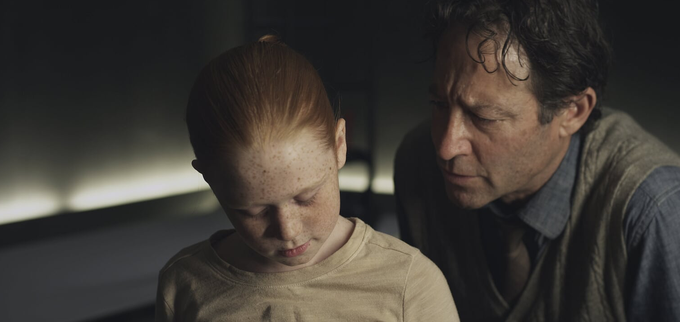
When Alex called Ellie/Savannah a psychopath in our conversation, I took exception, comparing it to calling Scrooge a miser after seeing A CHRISTMAS CAROL. “But she’s changed! Maybe not completely, but you can’t call Ellie a psycho at the end of the film, surely…”
Alex laughed at this mercilessly. “Oh, sure, she’s reformed! She’s changed her ways.” The teasing, ‘I’m playing along with you’ insincerity of this remark didn’t rock me, but it sure makes me want to see a television series based on PRODIGY. There are just too many interesting things the film never got to explore, like Ellie’s very complicated and disconnected relationship to Fonda as a possible father figure, the possible romance both in the past and the present) between Fonda and Olivia, her real, actual father whom we haven’t met yet, and Dr. Werner’s secret directive.
I can’t help but imagine what a great story, set across four seasons, it would make to see the supremely confident Ellie face the emotions and biological imperatives that come with puberty and her teens… at the same time the government grooms Ellie to be an assassin, and Fonda tries to develop her to make her own moral and ethical choices and these things also war with what Ellie wants for herself, supremely. Her mother issues, her father issues… and Fonda and Olivia caught up in Ellie’s machinations to be free. I hope they do this and bring back this entire cast and crew for it. I’d love to write for it.
This has been my favorite interview for AICN to date; I found the whole crew to be very warm and easy with each other, and me. They were a friendly, practical jokey set that never took itself too seriously, but managed to pull off one of my favorite new creative worlds this year. I didn’t get a sense that these people were mere working colleagues, but friends and collaborators, and that just increased my affection for the film.
That brings us to the end of my review. Thanks for reading! PRODIGY is available through iTunes here (https://apple.co/2CboRMT) or Amazon here (Watch it now!).
— Precious Roy
